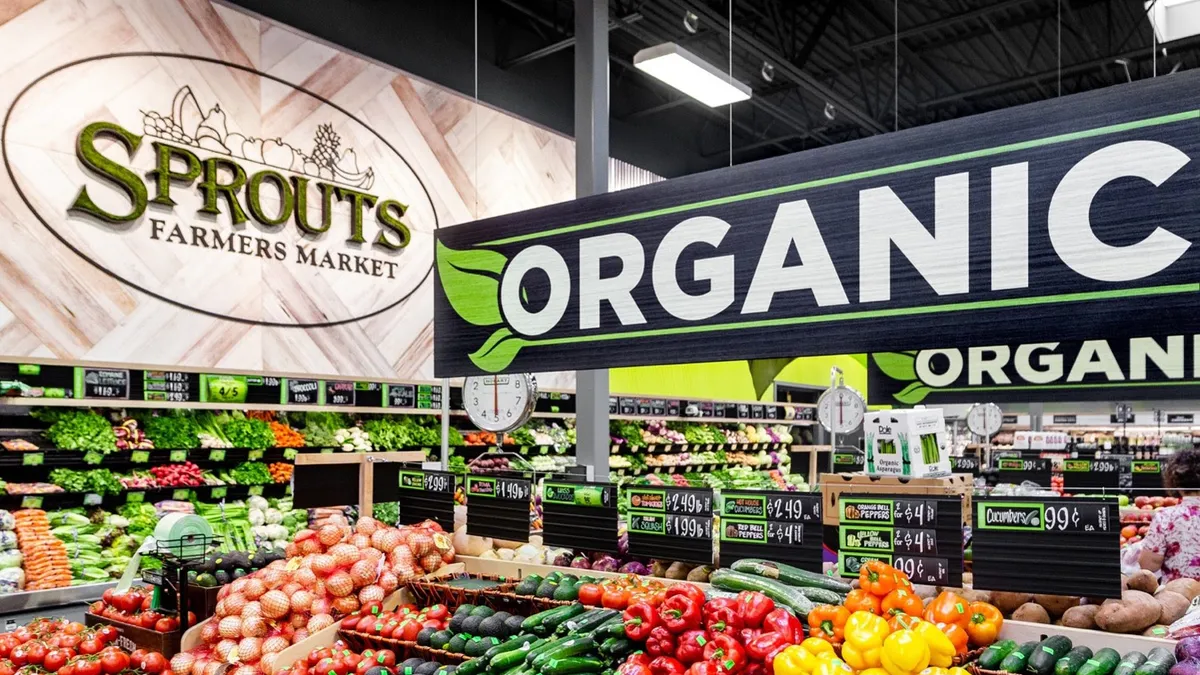Dive Brief:
- Sprouts reported its fourth-quarter net sales for fiscal 2019 increased 8% to $1.4 billion year over year, while net sales for the year also increased 8% to $5.6 billion compared to 2018, the company reported during its earnings call Thursday after market close. Comparable store sales grew 1.5% for Q4 and 1.1% for 2019. Fourth-quarter gross profit rose by 11% to $469 million while gross margin was 34.4%.
- Its Q4 diluted earnings per share is 27 cents compared to 10 cents the year. Its selling, general and administrative expenses increased in both Q4 and for fiscal 2019 due to store and home delivery expansions, higher healthcare costs, increased credit card fees and ongoing strategy work. For the quarter, earnings before taxes reached $42 million, a 27% increase year over year.
- The company invested $157 million in capital expenditures, net of landlord reimbursements primarily for new stores. During the fiscal year, Sprouts opened 28 new stores and closed one, ending the year with 340 stores in 22 states.
Dive Insight:
Sprouts has seen margins begin to stabilize this quarter after refining its promotional strategies to focus on opportunities in the marketplace rather than reacting to competitor pricing, on in-store promotion of unique items and reallocation of marketing dollars. In the past, excessive spending on promotions was deflating its sales. Despite this positive change, in-store traffic still remains low, Sprouts interim CFO, Lawrence Molloy explained in an earnings call. Beginning Friday, Molloy will be replaced by Denise Paulonis who has years of experience working in food retail and specialty grocers.
“As we move towards a new marketing strategy, a stronger everyday price position and pulling back on unprofitable promotions it may result in continued traffic headwinds. We expect an adjustment period and then profitable customers will respond," said Jack Sinclair, CEO of Sprouts Farmers Market, during the earnings calls.
Going forward the retailer expects gross margins to be slightly positive for 2020 with the most benefits occurring in the first three quarters. In addition to its change in promotional strategies, the retailer has also invested in initiatives to jumpstart innovation including its innovation summits and its new think tank panel, which incubates start-up brands and expects to make improvements in its supply chain network that could contribute to this positive outlook.
“Our supply chain has been disjointed with our growth. This will be corrected in short order, and will separate us from other competitors who lack this infrastructure," Sinclair added.
Many of Sprouts’ distribution centers were miles away from its stores resulting in increased costs and challenges in freshness. The retailer will be investing in closer distribution networks, which should reduce costs, improve quality and the stores ability to source more locally produced products.
This improvement in the supply chain will support the retailer’s store expansion goal as well. Sprouts expects to open 20 new stores in 2020, with a focus on the smaller store format similar to its older Southern California stores. It wants to focus its growth on Florida, as well as Georgia where its existing 16 stores have seen improvement in-store operations, which its lacked in previous years. The grocer also sees growth opportunities in the Mid-Atlantic, Texas and the Southwest regions.
Much of Sprouts’ competition in these regions has dissolved as specialty grocers like Earth Fare and Lucky's Market have shut down operations or filed for bankruptcy. One of the biggest reasons behind the failure of these retailers was expanding too quickly — something Sprouts should be mindful of in its growth plans.
E-commerce and digital growth are also vital in today’s grocery landscape, something many specialty retailers often overlook or don’t prioritize. In 2019, Sprouts reports it increased digital subscribers to more than 2 million accounts, up more than 35% for the year and home delivery saw a 150% increase over the year. After positive feedback from shoppers, the retailer plans to expand its test of self-checkout to more stores in 2020.
“The concentration of stores back by our supply chain network and a focused marketing program on our target customers coupled together will create optimal store economics. I look forward to sharing the detailed strategic vision with you all at our next earnings call," said Sinclair.













